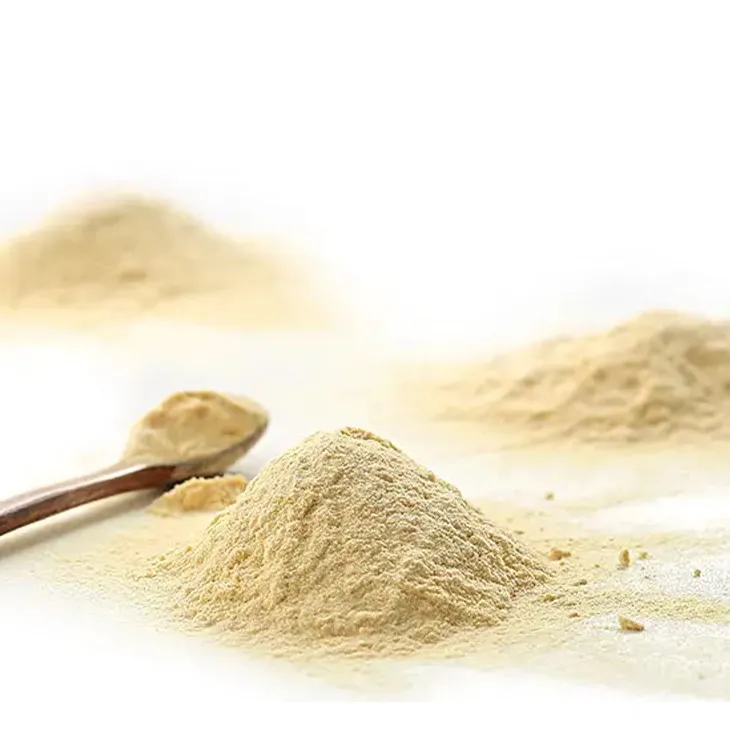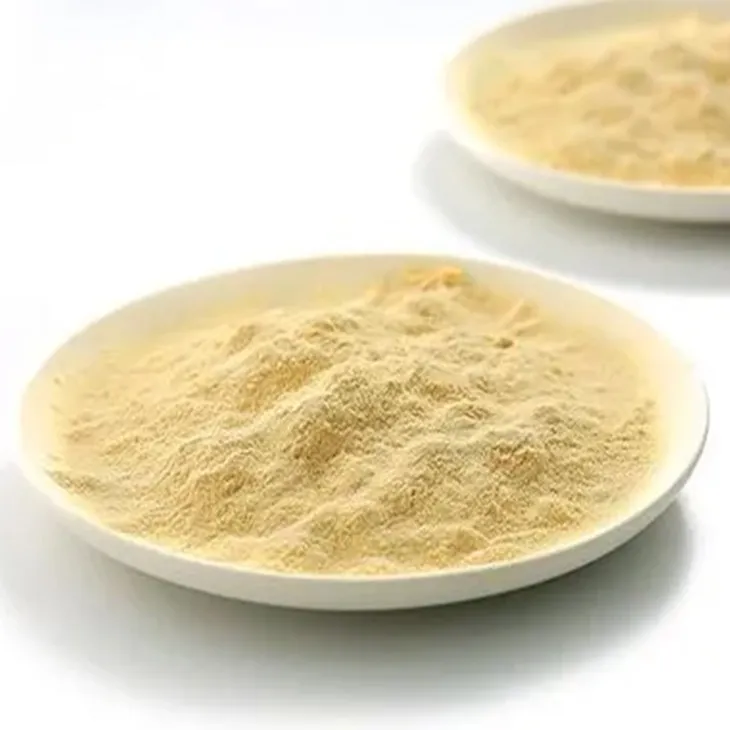- 0086-571-85302990
- sales@greenskybio.com
Six amazing effects of selenium yeast for creating perfect skin!
2024-11-14

1. Introduction
Beautiful skin is often considered a sign of health and vitality. In the pursuit of perfect skin, people are constantly exploring various nutrients and substances that can have a positive impact on skin health. One such substance that has been gaining attention is Selenium yeast. Selenium yeast is a rich source of selenium, an essential trace element that plays a crucial role in many physiological processes in the body, including those related to skin health. In this article, we will explore in depth the six amazing effects of Selenium yeast on creating perfect skin and understand the reasons behind these effects.

2. Antioxidant Protection
2.1. The role of antioxidants in skin health
Antioxidants are substances that can prevent or slow down damage to cells caused by free radicals. Free radicals are unstable molecules that are produced during normal metabolic processes in the body, as well as due to external factors such as UV radiation, pollution, and smoking. In the skin, free radicals can cause oxidative stress, which can lead to a variety of problems such as premature aging, wrinkles, and dullness.
2.2. Selenium yeast as an antioxidant
Selenium yeast contains selenium, which is an important part of antioxidant enzymes such as glutathione peroxidase. These enzymes help to neutralize free radicals in the body, including those in the skin. By reducing oxidative stress, selenium yeast can help to protect the skin from damage caused by free radicals. This can result in a reduction in the appearance of wrinkles, fine lines, and an improvement in overall skin texture. It also helps to maintain the skin's elasticity, making it look more youthful and vibrant.

3. Anti - inflammatory Effects
3.1. Inflammation and skin problems
Inflammation in the skin can be caused by a variety of factors, including allergens, infections, and autoimmune disorders. Chronic inflammation can lead to skin conditions such as acne, eczema, psoriasis, and rosacea. These conditions can cause discomfort, redness, swelling, and can also affect the appearance of the skin.
3.2. How selenium yeast reduces inflammation
Selenium yeast has anti - inflammatory properties. It can regulate the body's immune response and reduce the production of inflammatory mediators. For example, it can inhibit the activation of certain inflammatory cells such as macrophages and neutrophils. By reducing inflammation, selenium yeast can help to soothe irritated skin, reduce redness, and improve the overall condition of the skin. It can also be beneficial for those with chronic skin conditions, helping to manage symptoms and reduce flare - ups.
4. Regulation of Skin Immunity
4.1. Importance of skin immunity
The skin is the body's first line of defense against external pathogens. A healthy skin immune system is essential for protecting the skin from infections, such as bacterial, fungal, and viral infections. It also plays a role in maintaining the balance of the skin microbiota, which is important for overall skin health.
4.2. Selenium yeast and skin immunity
Selenium yeast can enhance the function of the skin's immune system. Selenium is involved in the activation and function of immune cells in the skin, such as lymphocytes and dendritic cells. By strengthening the skin's immune defenses, selenium yeast can help the skin to better resist infections and maintain a healthy microbial balance. This can result in fewer skin infections and a reduction in the risk of developing skin diseases associated with a weakened immune system.
5. Promotion of Skin Cell Regeneration
5.1. Skin cell turnover
The skin is constantly renewing itself through a process called skin cell turnover. Old or damaged skin cells are shed, and new cells are generated from the basal layer of the skin. This process is important for maintaining healthy skin, as it helps to replace damaged cells and keep the skin looking fresh and smooth.
5.2. Selenium yeast and skin cell regeneration
Selenium yeast can promote skin cell regeneration. Selenium is involved in various cellular processes that are essential for cell division and growth. By providing the necessary selenium, selenium yeast can support the production of new skin cells in the basal layer of the skin. This can lead to a faster turnover of skin cells, which can result in a reduction in the appearance of scars, blemishes, and an improvement in overall skin complexion. It also helps to keep the skin thick and supple, which is important for its barrier function.
6. Protection Against UV - Induced Damage
6.1. UV radiation and skin damage
Ultraviolet (UV) radiation from the sun is one of the major factors contributing to skin damage. UV radiation can cause DNA damage in skin cells, which can lead to mutations and an increased risk of skin cancer. It can also cause premature aging of the skin, including the formation of wrinkles, sunspots, and a loss of elasticity.
6.2. Selenium yeast and UV protection
Selenium yeast can offer some protection against UV - induced damage. The antioxidant properties of selenium yeast can help to neutralize free radicals generated by UV radiation. Additionally, selenium may play a role in DNA repair mechanisms in skin cells. By reducing oxidative stress and supporting DNA repair, selenium yeast can help to minimize the damage caused by UV radiation. However, it should be noted that selenium yeast is not a substitute for sunscreen, but can be used as an additional measure to protect the skin from the sun's harmful rays.
7. Influence on Skin Hydration
7.1. Importance of skin hydration
Proper skin hydration is essential for maintaining healthy skin. Hydrated skin looks plump, smooth, and has a healthy glow. Dehydrated skin, on the other hand, can appear dull, flaky, and more prone to wrinkles.
7.2. Selenium yeast and skin hydration
While the exact mechanism is not fully understood, selenium yeast may have an impact on skin hydration. It may help to improve the skin's barrier function, which can prevent water loss from the skin. By maintaining the skin's moisture balance, selenium yeast can contribute to the overall appearance of healthy, hydrated skin.
8. Conclusion
In conclusion, selenium yeast has a variety of amazing effects on creating perfect skin. Its antioxidant, anti - inflammatory, immunomodulatory, cell - regenerative, UV - protective, and potential hydrating properties all contribute to improving skin health. Incorporating selenium yeast into one's diet or skincare routine may be a beneficial step towards achieving and maintaining beautiful, healthy skin. However, it is important to note that while selenium yeast can be a useful addition, it should be used in moderation and in consultation with a healthcare professional, as excessive selenium intake can also have adverse effects. Overall, the potential of selenium yeast for skin health is an exciting area of research, and further studies are needed to fully understand its mechanisms and optimize its use for skin care.
FAQ:
Question 1: What is selenium yeast?
Selenium yeast is a form of selenium that is combined with yeast. It is a rich source of selenium, which is an essential trace element for the human body. In the context of skin health, it offers several benefits due to the properties of selenium.
Question 2: How does selenium yeast protect the skin from oxidative stress?
Selenium is a key component of antioxidant enzymes such as glutathione peroxidase. These enzymes help to neutralize free radicals in the body. Free radicals can cause oxidative stress to the skin, which may lead to premature aging, wrinkles, and dullness. Selenium yeast, by providing selenium, helps these antioxidant enzymes function properly, thus protecting the skin from oxidative damage.
Question 3: Can selenium yeast improve skin elasticity?
Yes, it can. Oxidative stress can break down collagen and elastin in the skin, which are crucial for maintaining skin elasticity. By reducing oxidative stress, selenium yeast helps to preserve collagen and elastin. Additionally, selenium may also play a role in the synthesis of new collagen, which further improves skin elasticity.
Question 4: Is selenium yeast effective in treating skin inflammation?
Selenium has anti - inflammatory properties. In the skin, it can help to regulate the immune response and reduce inflammation. Skin conditions such as acne, eczema, and psoriasis often involve inflammation. Selenium yeast can potentially alleviate these conditions by reducing the inflammatory response in the skin.
Question 5: How does selenium yeast contribute to a more even skin tone?
Oxidative stress and inflammation can disrupt the normal function of melanocytes, the cells that produce melanin in the skin. Uneven melanin production can lead to an uneven skin tone, such as dark spots and hyperpigmentation. Selenium yeast, through its antioxidant and anti - inflammatory effects, helps to maintain the normal function of melanocytes, resulting in a more even skin tone.
Related literature
- The Role of Selenium in Skin Health"
- "Selenium Yeast: A Promising Ingredient for Skin Wellness"
- "Beneficial Effects of Selenium on Skin - A Comprehensive Review"
- ▶ Hesperidin
- ▶ citrus bioflavonoids
- ▶ plant extract
- ▶ lycopene
- ▶ Diosmin
- ▶ Grape seed extract
- ▶ Sea buckthorn Juice Powder
- ▶ Beetroot powder
- ▶ Hops Extract
- ▶ Artichoke Extract
- ▶ Reishi mushroom extract
- ▶ Astaxanthin
- ▶ Green Tea Extract
- ▶ Curcumin Extract
- ▶ Horse Chestnut Extract
- ▶ Other Problems
- ▶ Boswellia Serrata Extract
- ▶ Resveratrol Extract
- ▶ Marigold Extract
- ▶ Grape Leaf Extract
- ▶ blog3
-
High purity olive leaf extract
2024-11-14
-
Lavender oil extraction method
2024-11-14
-
100% organic virgin sea buckthorn fruit oil
2024-11-14
-
Lotus leaf extract powder factory in China
2024-11-14
-
China aged garlic extract supplier
2024-11-14
-
Deer antler extract powder manufacturer
2024-11-14
-
Saw palmetto extract vs whole herb
2024-11-14
-
Beetroot juice Powder
2024-11-14
-
Lily extract
2024-11-14
-
Calendula Extract
2024-11-14
-
Sophora Flavescens Root Extract
2024-11-14
-
Hericium erinaceus extract powder
2024-11-14
-
Curcumin
2024-11-14
-
Scutellaria Extract
2024-11-14
-
Jujube Extract
2024-11-14
-
Peppermint Extract Powder
2024-11-14
-
White mustard seed extract
2024-11-14





















